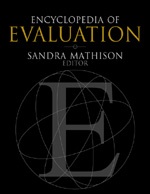If you are interested in a resource that will give you a quick overview of many topics and issues in evaluation you may find the Encyclopedia of Evaluation useful. More information about the Encyclopedia can be found on the Sage website.
Description:
All humans are nascent evaluators. Evaluation has been with us throughout history, and in its modern form has moved from the margins to the centers of organizations, agencies, educational institutions, and corporate boardrooms. No longer a specialized, part-time activity, evaluation has become institutionalized, a common practice, and indeed an important commodity in political and social life.
The Encyclopedia of Evaluation is an authoritative, first-of-its-kind who, what, where, why, and how of the field of evaluation. Covering professional practice as well as academia, this volume chronicles the development of the field—its history, key figures, theories, approaches, and goals. The entries in this encyclopedia capture the essence of evaluation as a practice (methods, techniques, roles, people), as a profession (professional obligations, shared knowledge, ethical imperatives, events, places) and as a discipline (theories and models of evaluation, ontological and epistemological issues).

 Follow
Follow

